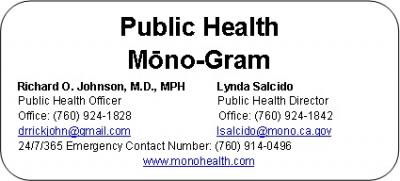Mono-Gram - Zika Update 3/30/2016
CDC Issues Updated Zika Recommendations for the Public:
Timing of Pregnancy after Zika Exposure and Prevention of Sexual Transmission
CDC has issued new guidance and information to prevent Zika virus transmission and health effects:
- Updated interim guidance for healthcare professionals for counseling patients about pregnancy planning and the timing of pregnancy after possible exposure to Zika virus;
- Updated interim guidance for preventing sexual transmission with information about how long men and women should consider using condoms or not having sex
CDC updates its interim guidance related to Zika virus transmission and related health effects based on the accumulating evidence, expert opinion, and knowledge about the risk associated with other viral infections. CDC will continue to update this guidance as new information becomes available.
Article 1: Updated interim guidance for pregnant and reproductive age women
Mounting evidence supports a link between Zika and microcephaly, a birth defect that is a sign of incomplete brain development, and possibly other problems such as miscarriage and stillbirth. The rate of these complications is not known but is being studied further. Importantly, even in places with active Zika transmission women are delivering apparently healthy infants. The updated CDC recommendations are these:
- For women and men who have been diagnosed with Zika virus or who have symptoms of Zika including fever, rash, joint pain or red eyes after possible exposure to Zika virus, CDC recommends:
- Women wait at least 8 weeks after their symptoms first appeared before trying to get pregnant.
- Men wait at least 6 months after their symptoms first appeared to have unprotected
- In making these recommendations, the CDC considered the longest known risk period for these categories. They then allowed for three times the known period of time.
- For men and women without symptoms of Zika virus but who had possible exposure to Zika from recent travel or sexual contact, CDC recommends that persons wait at least 8 weeks after their possible exposure before trying to get pregnant in order to minimize risk.
Article 2: Updated interim guidance for preventing sexual transmission of Zika
The recommendations for men who travel to an area with active Zika virus transmission who have a pregnant partner remain the same: CDC recommends that men with a pregnant partner should use condoms every time they have sex or not have sex for the duration of the pregnancy. To be effective, condoms must be used correctly from start to finish, every time during sex. This includes vaginal, anal or oral (mouth-to-penis) sex.
The updated guidance includes new timeframes for men and their non-pregnant partners based on the couple’s situation, including whether the man lives in or has traveled to an area with active Zika virus transmission and whether he develops symptoms of possible Zika infection. The guidance is based on available information about how long the virus remains in semen and the risks associated with Zika based on whether or not men had symptoms of infection:
- Couples with men who have confirmed Zika or symptoms of Zika should consider using condoms or not having sex for at least 6 months after symptoms begin. This includes men who live in and men who traveled to areas with Zika.
- Couples with men who traveled to an area with Zika but did not develop symptoms of Zika should consider using condoms or not having sex for at least 8 weeks after their return in order to minimize risk.
- Couples with men who live in an area with Zika but have not developed symptoms might consider using condoms or not having sex while there is active Zika transmission in the area.
Couples who do not want to get pregnant should use the most effective contraceptive methods that they can use consistently and correctly, and they should also use condoms to prevent the sexual transmission of Zika. Couples who are trying to get pregnant should consult with their healthcare provider.
Summary of current situation:
Women who want to get pregnant, or whose partner has had exposure to Zika virus, should discuss with their health care provider any potential risk of Zika virus during pregnancy. The virus can spread from a woman to her child during pregnancy and the infection is believed to lead to neurologic complications in the infant, including microcephaly, which is a birth defect in which the baby is born with a smaller-than-normal head due to abnormal brain development.
Most people infected with Zika virus will not develop symptoms. If symptoms do develop, they are usually mild and include fever, rash, joint pain and eye redness. If you have returned from an affected country and you have fever with rash, joint pain, and eye redness within two weeks, or any other symptoms following your return, please contact your health care provider and tell him/her where you have traveled. While there is no specific treatment for Zika virus disease, the best recommendations are supportive care, rest, fluids and medications for relief of fever.
Zika virus is primarily transmitted to people by mosquitoes known as Aedes aegypti (Asian tiger mosquito) and Aedes albopictus (yellow fever mosquito), which are the same type of mosquitoes that transmit dengue and chikungunya viruses. These types of mosquitoes have been detected in 12 California counties. To date, there have been 22 travel-associated cases of Zika virus reported in California in 2015-2016. In the USA, there have been 273 cases reported. Nineteen of the cases occurred in pregnant women, and 6 cases occurred through sexual transmission. There has been no local mosquito-borne transmission of Zika virus in California or the continental USA.
People who are traveling to areas with known Zika virus risk should take steps to avoid being bitten by mosquitoes, including:
- Use insect repellents containing DEET, picaridin, IR3535, oil of lemon eucalyptus or para-menthane-diol for long-lasting protection. If you use sunscreen and insect repellent, apply the sunscreen first and then the repellent. Pregnant women and women who are breastfeeding should choose an EPA-registered insect repellent and use it according to the product label.
- Wear long-sleeved shirts and long pants.
- Use air conditioning or window/door screens to keep mosquitoes outside. If you are not able to protect yourself from mosquitoes indoors, sleep under a mosquito bed net.
- Help reduce the number of mosquitoes outside by emptying standing water from containers, such as flowerpots or buckets.
For more information on Zika virus disease and other mosquito-borne illnesses, please visit the California Department of Public Health CDPH Zika virus information Web page.



